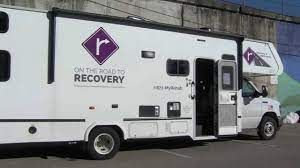Mobile units providing methadone and counseling increase access to treatment for opioid use disorder
Although methadone is a proven adjunct in the treatment of opioid use disorder (OUD), it is typically dispensed at opioid treatment programs (OTPs) that are often distant from those who would benefit from its use. To increase the availability of OTP services, the Drug Enforcement Agency adopted a rule allowing medications for opioid use disorder (MOUD) to be dispensed by mobile extensions of OTPs. Treatment clinics in several states, including Connecticut, Massachusetts, Maryland, California, Colorado, New Jersey, and New York, have implemented programs using vans or busses that make regular rounds in neighborhoods, allowing those with OUD to receive supervised doses of methadone and prescriptions for other medications. Clinic staff and peer counselors are usually available for consultation on links to local treatment, recovery, and harm reduction resources. Mobile units have also been used to make MOUD available at correctional facilities. Research suggests that rates of retention in MOUD treatment are generally higher for those using mobile units than for those traveling to stand alone facilities.
Three Bureau of Justice Assistance briefings describe mobile interventions to increase MOUD, including mobile extensions of OTPs (here, here, and here), and mobile extensions of OTPs are described in a journal review article and a news story. Communities seeking to increase access to MOUD may wish to consider contacting state and local treatment clinics to encourage implementation of OTP mobile extensions. Another option is adding brick-and-mortar medications units as extensions of OTPs. Guidance on overcoming barriers to implementation is available in this interview with a state health commissioner.
By going into the community, these vans ease the burden of people getting the help they need and demonstrates that you don’t need a brick-and-mortar clinic to get people life-saving treatment.









